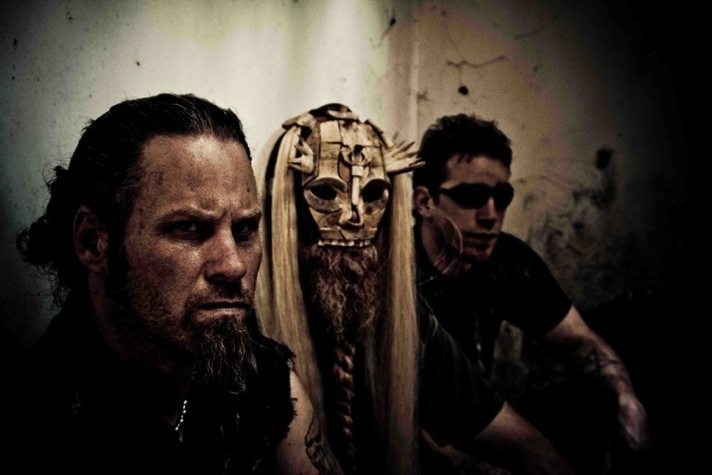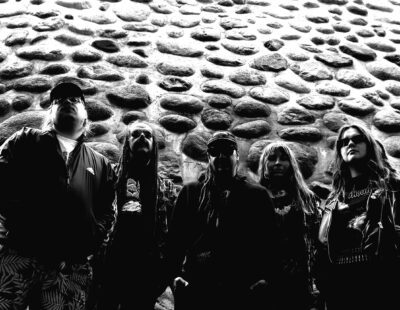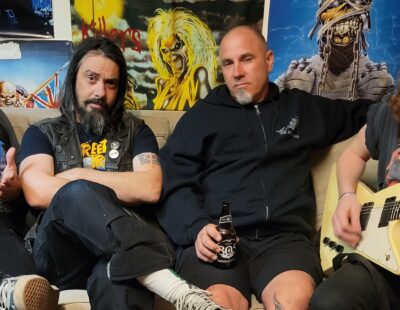
Phone conversations with Steve Tucker are always a blast. The former/current Morbid Angel, former Nile, former Nader Sadek mouthpiece is one of the friendliest dudes around. He’s also always enthusiastic about his latest musical project, the head-crushing Warfather. Over two full-length albums (2014’s Orchestrating the Apocalypse and this year’s The Grey Eminence) he has laid out a decisive boredom termination campaign designed to raze your cranium and make you question the simple answers that sate the simpleminded.
We had the opportunity to speak with Tucker before the release of The Grey Eminence, and much of that conversation can be found here. If you haven’t done so yet, put your ears on the new record now. Discover what is hidden.
Last time we spoke, you mentioned listening to a lot of classical music and trying to incorporate some pretty heady musical ideas into your own work. How did your composition process work this time around?
I have always listened to classical music and I always will, usually just for those times when I don’t want to hear anything else in the world. That’s usually my choice to chill out. On this album, I think I took the influences from it, but to be honest with you, this time around I really wasn’t trying to base any kind of compositions the way I was then. Not really thinking about the songs, I thought, was a great thing. Just letting songs become good songs as opposed to trying to overthink them.
Did songs come out of you just jamming on ideas you had?
Every song’s different. Sometimes I’ll write a drum beat on the computer and I’ll be writing guitars to it. A lot of times, it just comes from jamming around. I’ll just be playing guitar and end up catching a moment and just build on it. When I’m writing songs, does it catch my attention? Does a riff catch my attention? If it does, I build on it and it becomes a song.
One thing drastically different about this album than the last is that I didn’t write everything on this album. The new guitar player, Jake [Kock], wrote quite a bit. He wrote, I think, four songs… Some of the songs have a riff or two of mine in them, and I arrange them in the end for vocals, but his contributions were great, because working with someone else, they make a contribution that sparks an idea. It was really good to be able to get to play with someone else during the process and have other ideas and other opinions involved.
How did he get on board?
When I decided I wanted a different guitar player, he was introduced to me by an old friend of mine. I asked, “Hey, man, who’s the best guitar player [you know]?” And he introduced me to Jake, and it worked out. I didn’t try out three or four other guys, it just really worked. We hit it off from Day One when we met. What I really wanted was somebody I could work with in all ways, all aspects of the relationship. Like I said, I started off just looking for a great guy, a great guitar player, and Jake ended up being a surprise.
What’s important to you when you’re writing lyrics?
The lyrics are generally things that have been rolling around my head for a long time. Ideas and opinions… A lot of times when I’m writing lyrics, they’re not even necessarily my opinion, they’re just two contrasting opinions for the sake of argument. With this album, I think the overall thought process that was going on in my mind for me helped with the riffs, because I had this certain aggravated feeling about what the world is at the moment. This certain feeling of uneasiness, where I think it seems, regardless of what anybody says – I know that there’s conspiracy theory after conspiracy theory – but it’s starting to seem to me that a lot of those conspiracy theories are starting to be proven true. The world seems to be not really what it’s been painted to be, and that’s really what the album’s about: hidden agendas in the world. To be honest, that definitely contributed to the writing. I think it contributed to the aggressiveness of the writing.
Usually when I’m writing songs, the music comes first. Generally, I think it’s a whole aggravated state of being that causes the music and the lyrics to come. There’s this angst, and somehow without them ever existing, they are combined. I don’t know how to explain it, but it feels that way to me.
The title is interesting. Can you talk about that a bit?
The ‘grey eminence’ is not the person on TV telling you what happened or what’s going to happen. They’re the people that are behind the scenes controlling things that happen. Everyone knows that pretty much all the media in the world is owned by a handful of people. Whenever that’s the case, any opinion that you’re going to get is only ever going to be one-sided, unless that person is completely bipartisan and impartial in every single way, and allows the news to come out and be the news, you’re always going to get opinionated news. So they are a grey eminence.
When I did Orchestrating the Apocalypse, it was about all the factors that come together to make this great change. I have to say, in hindsight, around the time that the album came out, I think that change was really starting in the world. There’s no doubt that the world is right on the brink of some sort of drastic change. England leaving the E.U.? That is not a little situation. That is a big situation that affects the entire world. And I think that’s come about because of some of the other things that have happened in the past five, six, seven years. In the end, what it really looks like is a great disaster, which is really an apocalypse.
Now, The Grey Eminence is about pointing out that maybe this was a plan all along. Maybe they’ve been feeding these lies to us and feeding these opinions to us for so long because there truly is another agenda. This one world agenda that some people scoff at and other people openly talk about.
It’s to the point where, if someone doesn’t like someone else’s idea, they get violent. They protest and it becomes violent. Very rarely are there peaceful protests in the world. And I mean anywhere in the world, I’m not really talking about the United States, I’m talking about the world. People reach a certain point where they revolt, and it feels to me that the world has been living in that for approximately the past ten years. Right now we’re really seeing the outcome of some of these drastic changes that have been made.
What do you hope for the world?
I’m not a politician, I never want to be a politician. I do have my beliefs, and I will stand strong and fight for my beliefs, and I will protect others standing strong for their beliefs. And I’m not talking any religious thing like that, because I’m not religious, I never have been religious, and religion to me is just not something that really affects my opinion on someone, it’s more of an individual thing. But what I see is, there’s so many people that have this opinion, and so many people that have this other opinion and they are willing to fight, and I guess that’s due to frustration. I have to say that I honestly feel the same frustrations. I feel frustration when I see something that happens in another country and our government deals with it one way, and when the same thing happens in our country they deal with it completely differently because they want us to have one opinion and they want other people to have another opinion. I see those things, I take them in, and honestly it all becomes songs. It’s also a real human opinion: I do have my own opinions, and if chaos erupted, then yes, I would defend my opinions, I would defend my family, I would protect what I believe in.
How did the recording process go? How were those decisions made?
Long before the songs were even close to being done, I was already talking to Erik Rutan. It was already planned. I didn’t want to record at two or three different studios [as Orchestrating was], I didn’t want there to be issues with scheduling, so it was planned for it all to be done in one shot. Go down to Florida, go to the studio, be there til it’s done. There were no real detours. There was no possibility of detours. There were things that happened during the making of the record – I think there might have been a computer issue at one point – but it’s a professional place, Erik’s a professional man, and he had back-up ready to go within a half-hour and we were back to work.
What do you think of the result when you listen back to it?
I get into the album and forget that I’m even listening for things [I’d like to change]. I just enjoy it so much that it just becomes like I’m listening to someone else’s album and I get to just enjoy it. That is a great release for me.
Is that different from your feelings about Orchestrating the Apocalypse?
From the opening second of that album, there’s things that I wish were different. Going into [Orchestrating the Apocalypse], I really didn’t want it to be like what I was very comfortable writing. There were more great riffs that I just didn’t use because I wanted it to go in a different direction. I wanted it to feel different than I had written before. I have to be honest about it. It is what it is. It sounds insane because it is insane. It was a lesson learned in life. I learned a very valuable lesson on that album, and I made mistakes that will never be made again, and for that reason it’s valuable to me. It’s insanity on a CD. And that’s fine with me, but now I’m extremely proud of this album.






